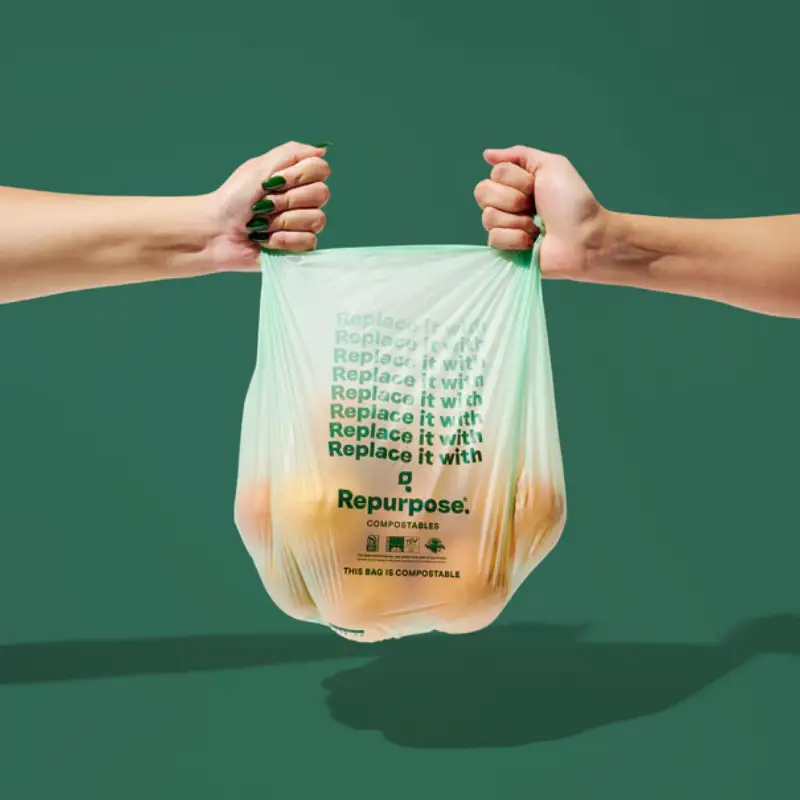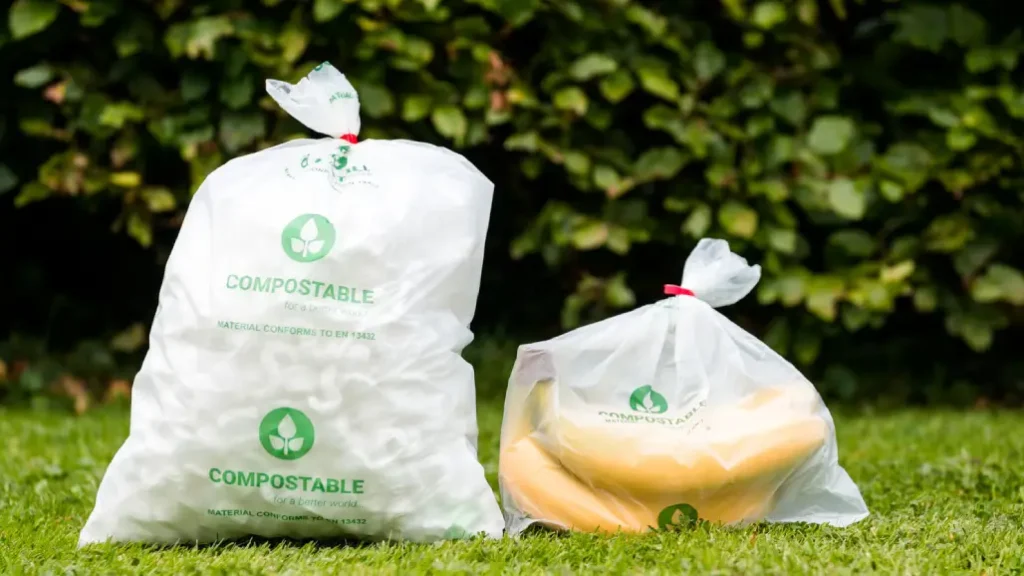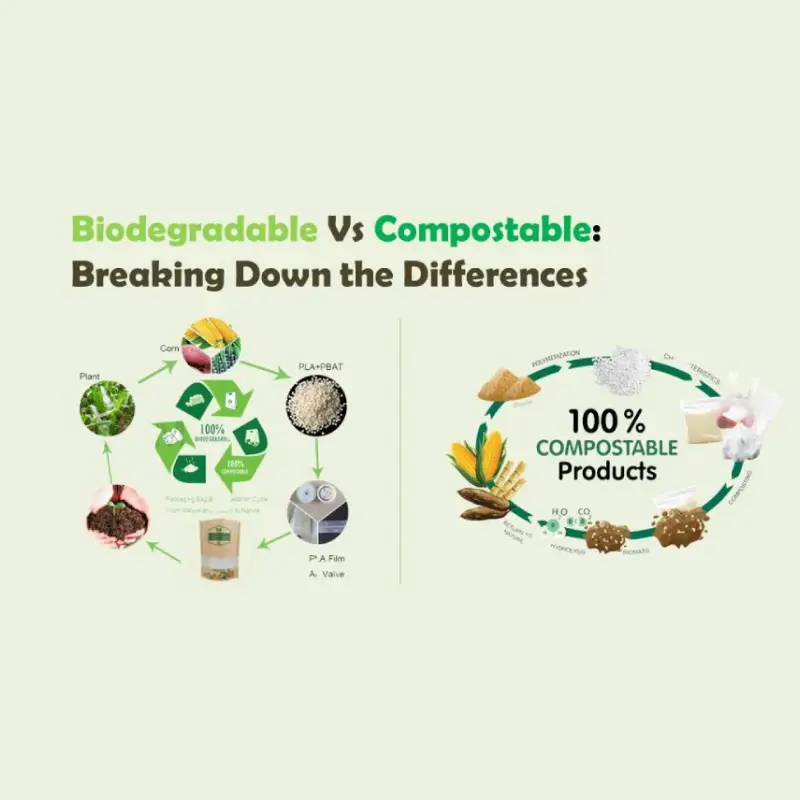We’re constantly bombarded with terms like “biodegradable” and “compostable.” While both terms suggest eco-friendliness, they don’t necessarily mean the same thing.
Understanding the key differences between biodegradable and compostable bags is crucial for making informed choices and minimizing our environmental impact. This blog post will delve into the specifics of each term, exploring their definitions, breakdown processes, and the implications for our planet.
By the end, you’ll have a clear understanding of which bags are truly sustainable and how to choose the most eco-friendly options for your everyday needs. Let’s dive in and uncover the truth behind these often-misunderstood terms.
What Are Biodegradable Bags

Biodegradable bags are designed to break down naturally over time through the action of microorganisms like bacteria and fungi. This decomposition process transforms the bag into simpler substances such as water, carbon dioxide, and biomass, which can be absorbed back into the environment.
The materials used to create biodegradable bags can vary greatly. Some are made from plant-based materials like corn starch or vegetable oils, while others may be traditional petroleum-based plastics that have been modified with additives to accelerate their breakdown.
What Are Compostable Bags

Compostable bags are a specific type of biodegradable bag that is designed to break down completely into natural elements within a relatively short timeframe. This breakdown occurs in a controlled environment like a commercial composting facility, where specific conditions like temperature, moisture, and oxygen levels are maintained.
These bags are typically made from renewable resources such as plant starches (like corn or potato starch), cellulose, or other bio-based polymers. They are certified to meet specific standards, ensuring they decompose safely and effectively without leaving any harmful residues.
Biodegradable vs Compostable Bags

Both biodegradable and compostable bags offer eco-friendly alternatives to traditional plastic, but their characteristics and environmental impact differ significantly.
Biodegradable Bags:
- Biodegradable bags are designed to break down into smaller pieces over time through the action of microorganisms like bacteria and fungi. This process can occur in various environments, including landfills, soil, and water.
- Materials: Biodegradable bags can be made from a wide range of materials, including:
- Plant-based materials: Cornstarch, vegetable oils, and other plant-derived polymers.
- Modified traditional plastics: Petroleum-based plastics treated with additives to accelerate their breakdown.
- Breakdown Process: The breakdown process of biodegradable bags can vary significantly depending on the materials used, environmental conditions (temperature, moisture, oxygen availability), and the presence of microorganisms.
- Potential Limitations:
- Incomplete Decomposition: Biodegradable bags may not always decompose completely into harmless substances. They can sometimes break down into smaller plastic particles (microplastics), which can persist in the environment and potentially harm wildlife.
- Unpredictable Results: The breakdown time of biodegradable bags can be difficult to predict and may vary significantly depending on environmental factors.
Compostable Bags:
- Compostable bags are a specific type of biodegradable bag that is certified to break down completely into organic matter within a relatively short timeframe. This breakdown occurs in controlled conditions, such as commercial composting facilities, where specific temperature, moisture, and oxygen levels are maintained.
- Materials: Compostable bags are typically made from renewable resources such as:
- Plant starches: Corn starch, potato starch.
- Cellulose: Derived from plants.
- Other bio-based polymers: Produced from renewable sources.
- Breakdown Process: In a controlled composting environment, compostable bags break down into water, carbon dioxide, and biomass, which enriches the soil.
- Certification: To be certified as compostable, bags must meet specific standards, ensuring they decompose safely and effectively without leaving any harmful residues.
- Proper Disposal: It’s crucial to dispose of compostable bags in designated composting facilities to ensure their intended environmental benefits are realized. Home composting may not provide the optimal conditions for their complete breakdown.
Key Differences between biodegradable and compostable bags in the following table:
| Feature | Biodegradable Bags | Compostable Bags |
|---|---|---|
| Definition | Break down into smaller pieces | Break down completely into organic matter |
| Breakdown Conditions | Can occur in various environments | Require controlled composting conditions |
| Materials | Diverse range of materials | Primarily plant-based materials |
| Certification | Not always certified | Certified to meet specific standards |
| Environmental Impact | May not always decompose completely | Decompose completely, enriching the soil |
| Disposal | Can be disposed of in various ways | Require proper disposal in composting facilities |
While both biodegradable and compostable bags offer eco-friendly alternatives to conventional plastic, compostable bags generally represent a more sustainable option due to their complete biodegradability and their potential to contribute to soil enrichment. Choosing compostable bags whenever possible and disposing of them correctly can significantly reduce your environmental impact.
Compostable vs Biodegradable Trash Bags
Both compostable and biodegradable trash bags offer eco-friendly alternatives to traditional plastic, but they differ significantly in their breakdown process and environmental impact.
Biodegradable Trash Bags:
These bags are designed to break down into smaller pieces over time through the action of microorganisms like bacteria and fungi.
- Materials: Can be made from a variety of materials, including:
- Plant-based materials: Cornstarch, vegetable oils, and other plant-derived polymers.
- Modified traditional plastics: Petroleum-based plastics treated with additives to accelerate their breakdown.
- Breakdown Process: The breakdown process can be slow and may not always result in complete decomposition. They may break down into microplastics, which can harm the environment.
- Environmental Impact: May not always decompose completely, potentially leading to microplastic pollution.
Compostable Trash Bags:
These bags are specifically designed to break down completely into organic matter within a relatively short timeframe in a controlled composting environment.
- Materials: Typically made from renewable resources such as:
- Plant starches: Corn starch, potato starch.
- Cellulose: Derived from plants.
- Other bio-based polymers: Produced from renewable sources.
- Breakdown Process: In a commercial composting facility, they break down into water, carbon dioxide, and biomass, which enriches the soil.
- Certification: Must meet specific standards to be certified as compostable, ensuring they decompose safely and effectively.
- Environmental Impact: When properly composted, they offer a more sustainable option, reducing landfill waste and contributing to soil health.
Key Differences of compostable vs. biodegradable trash bags
| Feature | Biodegradable Trash Bags | Compostable Trash Bags |
|---|---|---|
| Definition | Break down into smaller pieces | Break down completely into organic matter |
| Breakdown Conditions | Can occur in various environments | Require controlled composting conditions |
| Materials | Diverse range of materials | Primarily plant-based materials |
| Certification | Not always certified | Certified to meet specific standards |
| Environmental Impact | May not always decompose completely, potential for microplastic pollution | Decompose completely, enriching the soil |
| Disposal | Can be disposed of in various ways | Require proper disposal in designated composting facilities |
Choosing the Right Option:
- Compostable bags: The most environmentally preferred option if you have access to a commercial composting facility and can ensure proper disposal.
- Biodegradable bags: May be a suitable option if composting access is limited, but consider the potential for incomplete decomposition and microplastic pollution.
By understanding the key differences between compostable and biodegradable trash bags, you can make informed choices that minimize your environmental impact and contribute to a more sustainable future.
Biodegradable Bags vs Plastic Bags
Biodegradable Bags:
- Made from: Plant-based materials (cornstarch, vegetable oils) or modified traditional plastics.
- Breakdown: Decompose into smaller pieces over time, but may not completely break down.
- Environmental Impact: Can still contribute to microplastic pollution.
Plastic Bags:
- Made from: Petroleum-based materials (polyethylene).
- Breakdown: Take hundreds of years to decompose in landfills.
- Environmental Impact: Contribute to pollution, harm wildlife, and disrupt ecosystems.
| Feature | Biodegradable Bags | Plastic Bags |
|---|---|---|
| Materials | Plant-based or modified plastics | Petroleum-based |
| Breakdown | Decompose into smaller pieces | Decompose very slowly |
| Environmental Impact | May still produce microplastics | Significant environmental harm |
While biodegradable bags offer a slight improvement over traditional plastic bags, they are not always a completely sustainable solution.
Biodegradable vs Compostable Poop Bags
Biodegradable Poop Bags
- Decompose into smaller pieces over time, often through the action of microorganisms.
- Materials: Can be made from a variety of materials, including plant-based materials like cornstarch or vegetable oils, or modified traditional plastics.
- Environmental Impact: May not always decompose completely, potentially leading to microplastic pollution.
Compostable Poop Bags
- Designed to break down completely into organic matter (water, carbon dioxide, and biomass) in a controlled composting environment.
- Materials: Typically made from renewable resources like plant starches (corn, potato), cellulose, or other bio-based polymers.
- Certification: Must meet specific standards to be certified as compostable, ensuring they decompose safely and effectively.
- Environmental Impact: When properly composted, they offer a more sustainable option, reducing landfill waste and contributing to soil health.
Key Differences between biodegradable poop bags vs compostable
| Feature | Biodegradable Poop Bags | Compostable Poop Bags |
|---|---|---|
| Breakdown | Decompose into smaller pieces | Decompose completely into organic matter |
| Materials | Diverse range of materials | Primarily plant-based materials |
| Certification | Not always certified | Certified to meet specific standards |
| Environmental Impact | May not always decompose completely, potential for microplastic pollution | Decompose completely, enriching the soil |
Choosing the Right Option
- Compostable bags: The most environmentally preferred option if you have access to a commercial composting facility and can ensure proper disposal.
- Biodegradable bags: May be a suitable option if composting access is limited, but consider the potential for incomplete decomposition and microplastic pollution.
Important Note: Even with compostable bags, it’s crucial to check local regulations and composting facility guidelines for accepted materials.
By understanding these differences, you can make informed choices about pet waste disposal and minimize your environmental impact.
What Kind of Waste Bag Should You Use
When it comes to choosing the most environmentally friendly waste bag, compostable bags are generally the best option.
Here’s why:
- Complete Breakdown: Compostable bags are designed to break down completely into organic matter (water, carbon dioxide, and biomass) in a controlled composting environment.
- Soil Enrichment: The breakdown process enriches the soil, making them a more sustainable choice compared to many other options.
- Reduced Landfill Waste: By composting organic waste, you divert it from landfills, reducing the volume of waste that ends up in these environmentally harmful sites.
However, it’s important to note:
- Proper Disposal: Compostable bags require proper disposal in designated composting facilities to achieve their intended environmental benefits.
- Availability: The availability of commercial composting facilities may vary depending on your location.
Biodegradable bags are another option, but they may not always decompose completely. They can sometimes break down into smaller plastic particles (microplastics), which can persist in the environment and potentially harm wildlife.
Ultimately, the best choice will depend on your specific circumstances and access to composting facilities.
Here’s a quick comparison:
| Feature | Compostable Bags | Biodegradable Bags |
|---|---|---|
| Breakdown | Complete breakdown into organic matter | May not always decompose completely |
| Environmental Impact | Reduce landfill waste, enrich soil | Potential for microplastic pollution |
| Disposal | Require proper disposal in composting facilities | Can be disposed of in various ways |
Conclusion
In conclusion, while both biodegradable and compostable bags offer eco-friendly alternatives to traditional plastic, understanding their key differences is crucial for making informed choices. Biodegradable bags break down into smaller pieces over time, but may not fully decompose into natural elements.
Compostable bags, on the other hand, are designed to break down completely into organic matter, enriching the soil. By choosing compostable bags, you actively contribute to a circular economy and minimize your environmental impact.
Ready to make the switch to eco-friendly packaging?
Contact us today to explore our wide range of high-quality, wholesale biodegradable bags. Let’s work together to create a more sustainable future.
